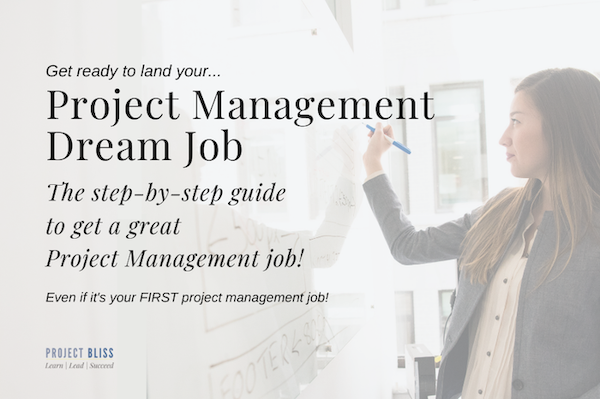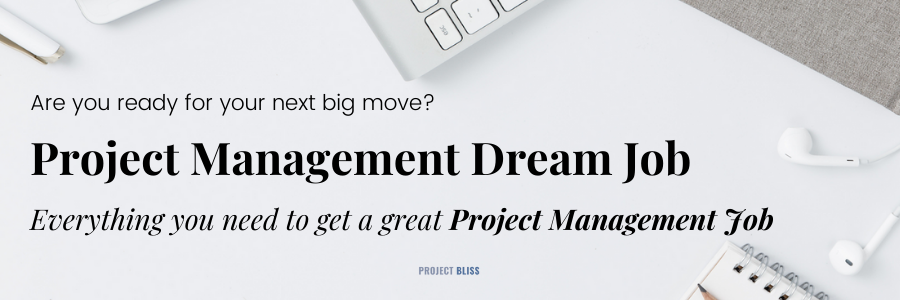
When you’re interviewing for that perfect project manager position, you need to be ready. You’re competing against multiple candidates, and you want to stand out as the best choice. Even if you’ve written the perfect resume and landed the perfect job interview, your preparation doesn’t stop there. You still need to ace the interview. And the hiring manager will most likely ask project manager behavioral interview questions.
Imagine these two scenarios:
You’re sitting across the table from the hiring manager. You didn’t prepare much because you think you’ll do fine. She asks you to tell her about a time when your project failed. You look up at the ceiling and say “Hmm…let me think.” And then you both sit in silence while you try to come up with something. You can’t think of anything because now you’re nervous and anxious. You’re aware of the growing silence. It’s clear to the interviewer you haven’t prepared and that you get stressed under pressure. She’s already decided that you’re not the right candidate for this position.
Now imagine that you’re sitting across from the same hiring manager, but in this scenario, you’ve taken time to prepare and practice your answers. She asks you to tell her about a time when your project failed. You readily tell a story about a project and the challenges that you and the team faced. You explain what caused the project to fail. You explain how you approached the situation and worked with the team. And you then explain what you learned from the experience. You tell what you’ve done differently going forward to avoid the same type of situation in the future. You’re calm and confident. The manager can see that you act accountably, don’t blame others, and have a growth mindset. She’s impressed.
Project Manager Behavioral Interview Questions
During the job interview, the manager is assessing you to determine if you’re the right candidate for the job. She wants to know if you meet the qualifications listed in the job posting. But she also wants to know if you possess qualities that make you the best fit for the team.
Project manager behavioral interview questions help give better insight to how you handle yourself in certain situations, and if you possess the skills that make you stand out from the others.
The list of Project manager behavioral interview questions below will help you prepare for your interview.
But first, you need to get a good understanding of what purpose they serve so you can use them to your advantage.
What Are Project Manager Behavioral Interview Questions?
Behavioral interview questions are questions based on your past experience. Interviewers want to know how you handled situations so they can get an idea of how you’ll perform on their team, and how you’ll handle certain challenges in the future.
The behavioral interview questions will usually sound like one of these options:
- Tell me about a time that you…
- Describe a situation when you…
The interviewer wants to know how you behaved or what you did. These behavior-based questions give the interviewer a chance to see how you respond to real-world challenges. Information on how you solved specific problems gives a better idea of your ability to handle them going forward. It also gives insight into how you think and approach challenges.
How to answer the Project Manager Behavioral Interview Questions – the STAR Technique
When answering project manager behavioral interview questions, it’s helpful to use the STAR approach. This technique helps you structure your responses in a way that ensures you’re giving the interviewer the information she’s looking for.
SITUATION – Explain the situation you were in or a time when you experienced the situation presented by the interviewer.
TASK – What was the task you were expected to accomplish?
ACTION – what did you do? How did you handle the situation?
RESULT – what was the outcome or result of your actions? What did you learn from the experience and have you grown from it in any way? Have you been able to apply what you learned going forward?
Use Stories
Storytelling is a great way to answer these questions. Tell stories about how you handled the situation, highlighting your strengths. Explain how you used your skills to overcome these challenges.
Princeton Career Services points out your responses should be “delivered as a story with an introduction, middle and positive ending.” When answering, even though you may be telling a story about a challenging or difficult time, make an effort to end on a positive note. Don’t blame others or criticize. Interviewers want to see that you act accountably.
An Example Answer to a Project Manager Behavioral Interview Question
To give you an idea of how to craft your stories, here’s an example demonstrating initiative, problem-solving, and teamwork:
I worked on a team that shared a resource with several other project teams. She installed and configured the VoIP telephones, and was the only person on the teams who could do this work. We had multiple ongoing consecutive projects that needed this work done. As a result, we had constant schedule conflicts and found that we often needed this person at the same time. She was frustrated and overwhelmed, and even threatened to leave the company. Our project schedules were at risk of slipping due to resource constraints and conflicts. Additionally, the relationship was often strained because of the demand placed on her.
The project managers got together to discuss how to address this issue. We collaborated on a solution that would address the problem. We decided to hold a meeting with this shared resource every two weeks to review project schedules and coordinate upcoming needs on an ongoing basis. This gave us better visibility to the conflicts, and it allowed us to work with one another to schedule her tasks appropriately. It also gave her more of a sense of control over her time and how she approached the work. It also sent a message to her that we respected her as a valuable team member. The meetings allowed us to level out her scheduling and reduce the stress for everyone. The projects stayed on schedule, and everyone’s needs were met.
Important Areas to Address in Answering Project Manager Behavioral Interview Questions
My posts on 10 Essential Qualities of Great Project Managers and Project Manager Roles and Responsibilities explain traits and experience the interviewer may be looking for. To get a more targeted view of what the interviewer considers valuable, review the job posting. However, these are traits valuable in any role:
- Problem-solving
- Communication
- Ability to handle stress and maintain composure
- Negotiation skills
- Adaptability to Change
- Accountability
- Leadership / Initiative
- Team Building
- Interpersonal skills
Finding ways to demonstrate that you have these traits will help you stand out and give the manager more confidence in you.
How To Prepare for the Project Manager Behavioral Interview Questions
The behavioral interview questions allow you to explain how you meet the qualifications listed above. Tell how you handled a challenging situation. Explain what you learned and how that growth helped you improve performance going forward. Think of several examples of challenges you faced, and also examples of successes you can share. Write Stories That Highlight the Qualities Listed Above
- Think of examples that demonstrate successes, and how you used initiative and project management skills.
- Identify examples of challenges that demonstrate how you solved problems, overcame obstacles or worked within difficult constraints.
- Write several stories that incorporate the qualities that managers value. Explain how you approached a challenge and worked through it. Tell how you adapted or solved a problem. Even if it wasn’t a full-on success, tell what you learned and how you carried the lesson forward.
Prepare and Practice
- Read through the list of questions below.
- Think about situations in your past and any that relate to any of the questions.
- Write your answers down.
- Practice your answers out loud.
- Start this process well in advance – not the day before your interview. You need time to get comfortable with your answers so they’re natural and easy to share during your interview.
Starting your preparation early gives you time to remember experiences from your past that address these questions. And if you don’t have a situation from on-the-job, look for experiences elsewhere that illustrate the point well. Leadership or team roles you’ve held in volunteer opportunities, with your church or other organizations, or even team sports can provide opportunities to tell how you’ve handled certain situations.
Get comfortable recounting these situations in the interview. Be ready with your information so that it comes naturally and you can communicate it easily.
Share Stories that Show Success and Growth
Some interviewers may ask questions in a way that doesn’t indicate they’re looking for a success story.
In this article, Forbes contributor Mark Murphy explains that interviewers can distinguish between those that bring problems rather than solve problems by changing the way they ask behavioral interview questions. Rather than phrasing the question in a way that indicates they’re looking for ultimate success or growth, they may just ask about a time you faced a specific problem. They might not ask about how you adapted or succeeded at all.
Watch for this tricky phrasing and be ready to tell your success story even if the interviewer doesn’t specifically ask how you succeeded.
Advance Preparation for Project Manager Behavioral Interview Questions is Key
The next step is to take the list of questions listed below and come up with your answers. You want to have these well-practiced and ready to use in the interview. Start well in advance to give yourself time to memorize these answers so that they come naturally during the interview.
Advance preparation will reduce stress during the interview, too.
Even if you’re not actively interviewing right now, it’s helpful to keep these interview questions in mind and start identifying ways that you’d answer them once you are in the job market. If you keep notes on answers as you come up with them throughout your current experience, it will be much easier to answer them when you’re interviewing in the future.
Project Manager Behavioral Interview Questions
Some of the questions are similar, and you won’t be asked all of these in one interview. I’ve provided the variations to prompt thinking through them in different ways. These will help you think of quite a few examples to showcase your amazing skills.
- Tell me about projects you’ve managed.
- Variation: Tell me about a recent project you managed.
- Tell about your most successful project. What made it so successful?
- Tell about a project that failed. How did you handle it?
- Have you ever had to deal with a project with unrealistic timelines?
- What project management methodologies are you familiar with or have you used?
- What’s the largest number of projects you’ve had at the same time? Did you find it challenging? Why or why not?
- How do you approach newly assigned projects? What do you do when a project is first assigned to you?
- How do you plan your projects and establish timelines?
- How do you ensure your projects are on track?
- How do you prefer to provide project status updates?
- How do you close your projects?
- How do you handle an uncooperative team member?
- How would you handle conflict on the team?
- Tell about a particularly challenging project you’ve managed. What about it was difficult? How did you handle the challenges?
- Tell about a challenging team member you dealt with.
- Tell about a challenging stakeholder you had on a project. How did you handle it?
- How do you manage project risk? Tell me how you’ve done it on previous projects.
- How do you communicate with your team?
- Tell me about a time you took the initiative without being prompted to make an improvement or solve a problem.
- Tell me about a time you had to persuade someone else to see your point-of-view or change someone’s mind. How did you go about it?
- How do you motivate your project team?
- Have you ever worked with a team member that failed to meet deadlines? How did you handle it?
- Tell me about a time you dealt with an unhappy customer.
- Tell about a particularly stressful event or situation and how you dealt with it.
- Tell how you demonstrate leadership to the team.
- Tell about how you schedule projects and manage milestones and timelines.
- How do you ensure the team stays on track to meet target dates?
- Have you ever had a team member who didn’t take responsibility for meeting commitments? If so, how did you handle it?
- Tell about a difficult decision you had to make. What made it difficult? How did you handle it? What was the outcome?
- Tell about a time when you knew your boss was wrong. How did you handle the situation?
- Tell about a time a teammate performed below average or did not meet commitments.
- Have you ever been given an urgent project that conflicted with other projects you’re working on? How did you handle the situation?
- Have you ever worked with a difficult boss? In what way was the boss difficult, and how did you handle it?
- Tell me about any goals you’ve set for yourself and attained. These can be professional or personal.
- Have you ever had an important project well underway, and then priorities changed? How did you handle it?
- Can you give an example of a time when you wish you’d handled a situation differently? What was it and how do you wish you’d handled it instead? Why?
- Have you worked with a customer or team member who was unresponsive? How did you handle it?
- Have you ever been on a team or part of a company that was undergoing a lot of change? How did you handle it?
- Give an example of a time when you went beyond your normal responsibilities.
Now that you’ve seen the list of project manager behavioral interview questions, the next step is to prepare. Even if you’re not currently interviewing, you can start crafting stories while in your current position. It will make your next interview that much smoother. Download the FREE workbook. It lists the skills that managers are looking for, along with worksheets for crafting stories and answers for each of the questions.





Excellent resource and very well explained. I am sitting for an interview after a very long time and these pointers have allowed me to think and recall various experiences that were locked away in memory.
How exciting! I hope your interview went well!
And thank you for the kind words. I’m glad the resource was helpful!
These are great! I have an interview Monday and you’ve covered most of the bases in this realm of quesitons.
So glad this was helpful! Good luck with your interview!
Leigh
Hi, I’m currently searching for a new PM role, 7 months, to no avail. I’m getting interviewed with great opportunities and great companies and I’m not closing the deal. I know it has to be my responses to these behavior interview questions (BIQ’s). I totally clam up and I end up reiterating the equivalent of jargon. I’ve been practicing but I haven’t taken the next step and really refined the act.
This list and the advice in this article are great, thank you tremendously. I have confidence that they’ll help refine my performance and land me one of these great new jobs.
Thanks, again.
– Doran
Doran,
I’m so glad this is helpful!
It sounds like practicing your answers out loud will really help. If you want to take it a step further, video record yourself answering them and watch, refine, repeat. You’ll get better and better. You could also have a friend ask you these questions and practice answering them in a mock interview.
Email me if you have specific questions. I’m happy to help.
And best of luck to you! I’d love to know how it goes!
Leigh